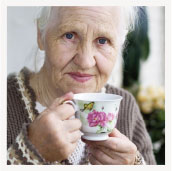-By Rose Gordon, Hospice Spiritual Care Counselor & Volunteer Coordinator.
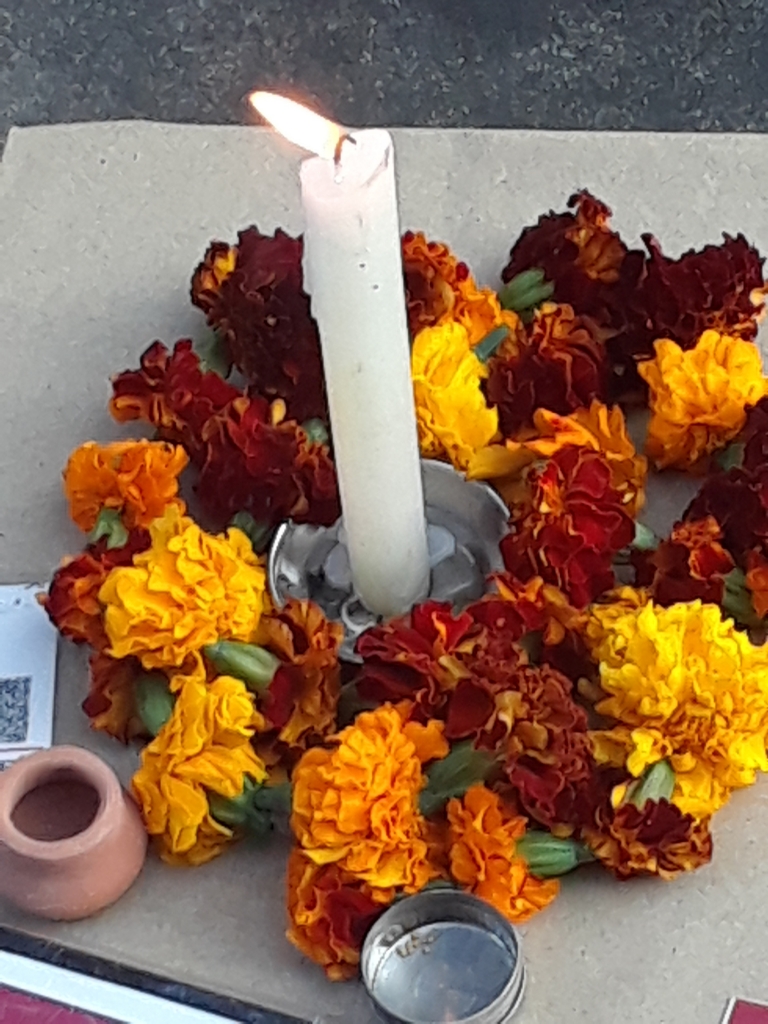 I was delighted to volunteer at Ganga Prem Hospice (GPH) in November and December 2017 and engage in providing the services they offer to patients in the cities of Rishikesh, Deradhun and Haridwar. In Northern India.
I was delighted to volunteer at Ganga Prem Hospice (GPH) in November and December 2017 and engage in providing the services they offer to patients in the cities of Rishikesh, Deradhun and Haridwar. In Northern India.
Ganga Prem is an inter-faith hospice that holds a free clinic every month, attended by up to 100 people who receive diagnosis, medications, wound care, counseling and other services they are unable to get elsewhere. Many, if not most, of the people are found to have cancer. If their condition calls for it they are, with their agreement, driven to the GPH in-patient hospice facility, located in the countryside.
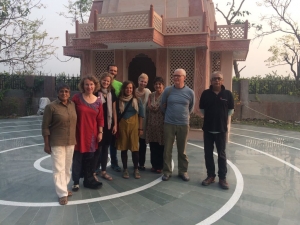
This is the hospice team.
It’s about a 45 minute drive from the main marketplace in Rishikesh to the hospice, along a busy highway and then on a dirt road through the jungle, which reportedly has both tigers and elephants, though I saw only large deer. Once through the jungle, the dirt road opens to an area of lush green fields, planted with grain, leafy green vegetables and squash. On both sides of the road are the simple homes of the local residents. Flat roofs hold the most recent harvest, left there to dry in the sun. Herbs and other vegetables hang from the porches. There are many thatched roof buildings for livestock and just behind the hospice is a large grove of guava trees, tended by women and children whose time is spent chasing birds away from the ripening fruit.
The three storied hospice itself was entirely built by donations. Each patient’s room has its own bathroom and small balcony and the area around the hospice is filling with flowers, shrubs and a vegetable garden. Large balconies circle the hospice, so that patients can sit in the fresh air and sunlight. The holy Ganges is within walking distance.
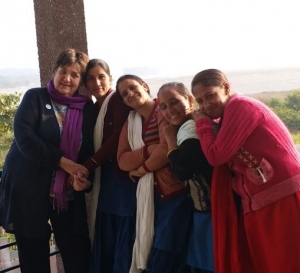
This is me (on the right) with the hospice support team.
The hospice is staffed primarily with visiting doctors, local Indian nurses, and the cook and housekeeping staff are from the nearby villages. I was part of a team of international volunteers, who each brought their specialty, expertise and experience. Even though most of the local staff do not speak English they do seem to understand it and of course laugher and so many other human interactions surpass language barriers.
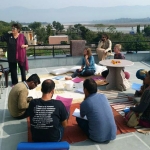
I was delighted to design a day long volunteer training for six new local male volunteers on the terrace of the GPH hospice.
I was able to engage in a variety of tasks while I was there, learning from others, and sharing my own life Hospice skills and experience. At the November Ganga Prem Cancer Camp I connected with one of the patients who was soon admitted to in-patient hospice. He is 17 and the when I met him he was tired and drooping – with an infection in his lungs and at the site of a recent surgery. After two days as an in-patient he had improved both physically and emotionally and possessed a delightful radiance.
At the Rotary Club in Rishikesh we had a lively discussion about end of life care in India. It was interesting to hear the stories they had about the death of their loved ones and how much they wish hospice or a fully integrated palliative care program had been available to help their loved one.
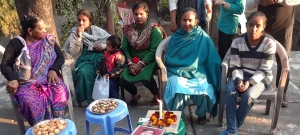
Bereavement for women.
We also offered Bereavement session to hospice staff, widows and children. The women who attended were an example of the courage and fortitude of so many of the Indian people I meet, and while there were lots of tears, there was a good deal of laughter and support. The children’s session included painting their own dikas, little clay lamps that are traditionally used during a special winter holiday.
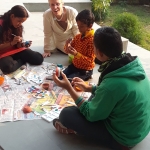
Bereavement with children.
Hospice is not common in India, and while there is some free health care, hospice is not supported financially by the Indian government. We are very fortunate here in the U.S. to have Hospice legislation in place that enables us to serve people at the end of life, without adding to the financial burden for them that terminal illness can create. In India, as in New Mexico, there were a variety of situations. Some patients were economically stable, others were not. Some were young, others elderly. Some had family to look after them, others were struggling to provide a future for the young children they were about to “leave behind”. I was deeply touched and honored by their hospitality, honesty, laughter, tears and above all, their courage. Those financially in need received all their hospice related medication, visits and supplies for free and efforts are being made in various ways to support other, related needs they have.
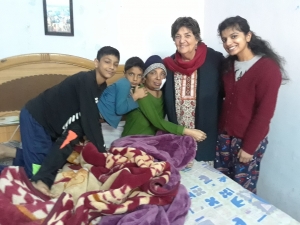
I also accompanied visiting doctors and RNs to the homes of hospice patients.
I encountered so much kindness in India and learned so much – from patients, GPH staff and other volunteers – from shop keepers who spoke to me about how “we have this life, we must use it to do good” and from the landscape, that abounds in prayer, beauty, cows, monkeys, trash and flower offerings.
I’ve returned to Taos, my home for over 40 years, and to Mt. Home Health Care and Hospice, with my commitment to hospice care renewed and enhanced.
Our patients and families are part of the community that I love, and being allowed to serve them at this profound time in their life is a deep honor. And now, perhaps more than ever, during these challenging times, I feel a deep abiding appreciation for the skills and dedication of all the people who are part of Mountain Home Hospice, for those in the field and behind the scenes.





